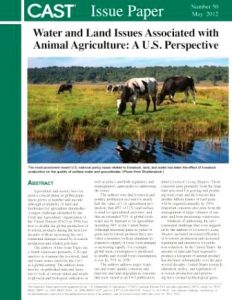 A new Issue Paper from the Council for Agricultural Science and Technology (CAST), titled Water and Land Issues Associated with Animal Agriculture: A U.S. Perspective, examines the livestock, land, and water issues raised by the Food and Agriculture Organization of the United Nations—including concerns examined in the publication titled Livestock’s Long Shadow. The authors draw heavily on published data and literature to look at current status and trends in physical and biological indicators as well as policy and both regulatory and non regulatory approaches to addressing issues such as rising meat consumption, water quality, land degradation, feed grain demands, and the large volumes of manure.
A new Issue Paper from the Council for Agricultural Science and Technology (CAST), titled Water and Land Issues Associated with Animal Agriculture: A U.S. Perspective, examines the livestock, land, and water issues raised by the Food and Agriculture Organization of the United Nations—including concerns examined in the publication titled Livestock’s Long Shadow. The authors draw heavily on published data and literature to look at current status and trends in physical and biological indicators as well as policy and both regulatory and non regulatory approaches to addressing issues such as rising meat consumption, water quality, land degradation, feed grain demands, and the large volumes of manure.
The experts who compiled this paper cover the production of beef, dairy, pork, and poultry, and they focus on
The authors point out that the relationship between livestock and land and water resources is directly affected by (1) improvements in productivity registered through technological gains and intensification, (2) improvements in waste management systems and understanding of pollution processes, and (3) emerging demands on livestock production systems to address other social goals.
This paper emphasizes the need for sustained research, development, and education to dramatically increase the productivity of livestock and related systems while decreasing resource use and negative environmental effects. As the concluding line states:
“Policy to ensure access to resources and education and timely distribution of food to the poorest people on the planet is needed to prevent disaster.”
Task Force Authors:
Click on the highlighted title at the upper right for a free download of CAST’s latest Issue Paper 50, Water and Land Issues Associated with Animal Agriculture: A U.S. Perspective.
Your donation to CAST helps support the CAST mission of communicating science to meet the challenge of producing enough food, fiber and fuel for a growing population. Every gift, no matter the size, is appreciated.